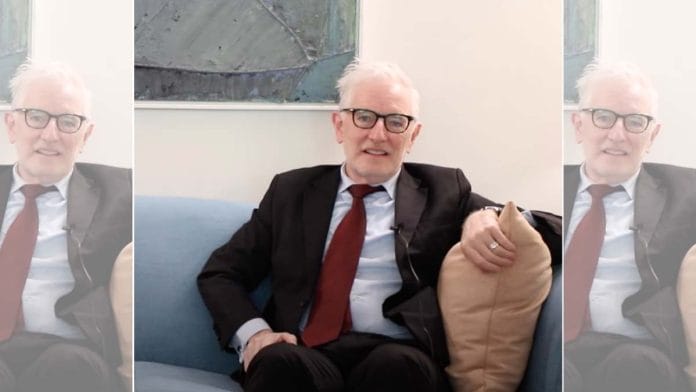New Delhi: Deepening economic ties, broadening cultural ties and promoting the shared history between Ireland and India are all a part of the mandate of Kevin Kelly, Ireland’s new ambassador to India. According to him, India is “front and centre” to Dublin’s thinking in the Asia-Pacific region.
“First of all I would say that it is no accident that the first country we’ve (Ireland) launched a local language version of this (Asia-Pacific) strategy is in India. India is hugely important to Ireland. It (India) is actually the first country in this whole region that we established diplomatic relations – 75 years ago,” said Kelly in an exclusive interview with ThePrint Thursday.
He added: “India is front and centre. India as we know is the fifth largest economy in the world and now the most populous country in the world…We (Ireland) really see huge importance in deepening and developing our relationship.”
Incidentally, 2024 is also the 60th year since Dublin opened an embassy here in New Delhi in 1964. To help deepen cultural ties, the Irish embassy in India will have a full time cultural attaché working with the embassy.
“One of the outcomes of the visit of the (Irish) Secretary General (foreign secretary) is that he has agreed to increase our staffing here in the embassy. We are going to have a full time cultural attaché working with our embassy. My hope is that we will be bringing Irish theatre, Irish drama, Irish writing to India,” explained Kelly.
He was referring to the visit of the Irish foreign secretary Joe Hackett, earlier in January 2024, when the Hindi language version of Dublin’s Asia – Pacific strategy was launched in New Delhi.
During Hackett’s visit he had said that the president of Ireland Michael D. Higgins had invited President Droupadi Murmu for a state visit to the country. Kelly is “hoping” that the visit could occur sometime this calendar year, but no date has been decided yet.
Also Read: Joint training, testing, data sharing — EU, India identify areas for counter-drone collaboration
EU-India FTA & conflict in Gaza
Kelly explained that Ireland is a “strong believer” in free trade agreements (FTA) and that Dublin wants to see the European Union and India sign such an agreement.
Brussels and New Delhi restarted negotiations for a FTA in July 2022, and has since completed six rounds of talks, with the latest being in October 2023.
“We (Ireland) are very keen that it (FTA) happens. We are a strong supporter of a free trade agreement because we see huge opportunities for both sides. We see opportunities for India in terms of access to a market of over 500 million people…We see real benefits for Europe for having a relationship with a country that is a continent on the rise,” said Kelly.
However, domestically within the European Union, protests involving farmers have broken out over the European Commission’s policies towards agriculture including free trade agreements. Kelly highlighted that it is the job of European governments to navigate the situation given that such agreements are overall economically beneficial.
Ireland was the first member of EU member states to call for a resolution of the Israel-Palestine conflict to be based on a fully sovereign Palestinian state in 1980. Since conflict broke out after Hamas’s attack on Israel on 7 October, 2023, Dublin has consistently called for a cessation of hostilities and provision of humanitarian aid to civilians in Gaza.
While perceived as an outlier position within the EU, Kelly reiterated Dublin’s support for the two-state solution and Israel’s right to defend itself within the boundaries of international law. The ambassador made it clear that Dublin does not support Hamas’s attack but must also raise its voice in support of the Gazan civilians affected by the conflict.
“Ireland being in favour of a two-state solution does not in any way negate our support for our bilateral partnership with Israel. We are also very keen to support the development of Palestine, its safety and its security,” explained Kelly.
He added: “We would like to think we have a values-based foreign policy. If you have a values based foreign policy it requires that you speak out and so we have done that and our minister has done that.”
(Edited by Amrtansh Arora)
Also Read: Govt departments split as trade talks with European pharma firms hit last lap, patent key issue






